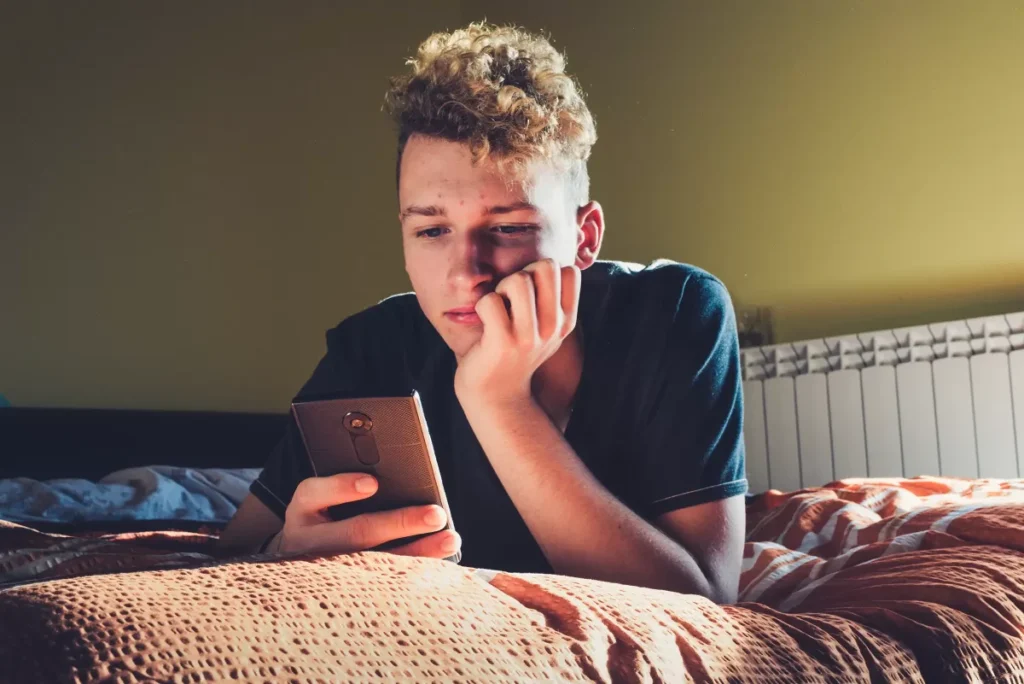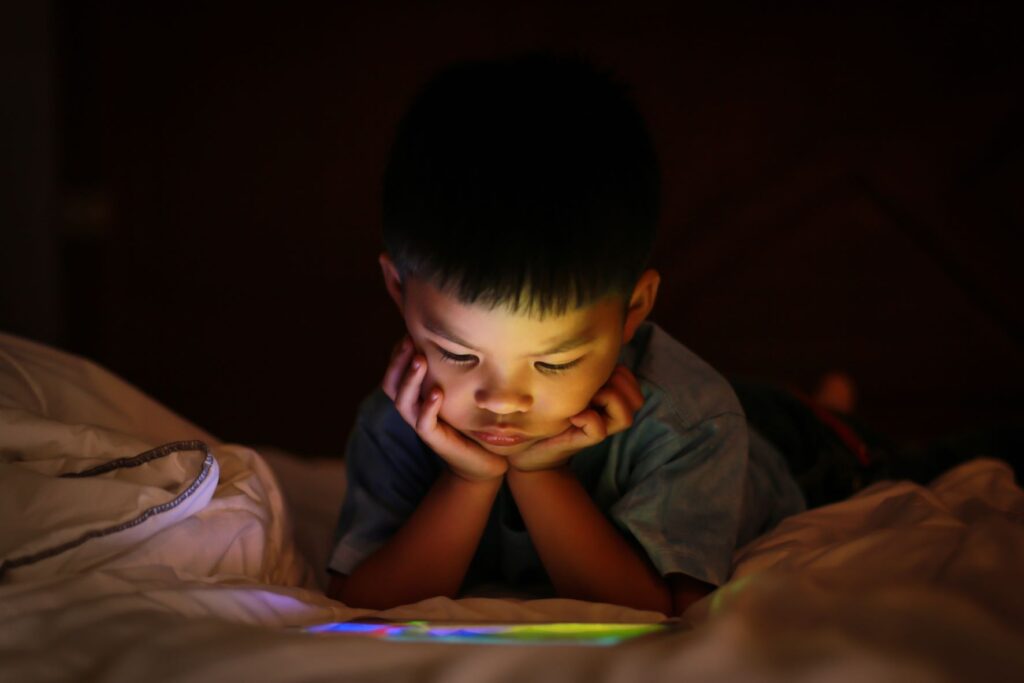Table of Contents

Introduction
In today’s digital era, screens are an ever-present element of our lives, dictating how we conduct our professional engagements, maintain social connections, learn new skills, and seek relaxation. From the moment we wake up to the second we drift off to sleep, we are surrounded by a plethora of devices that demand our attention.
The Effects of screen time on mental health advent of smartphones, tablets, laptops, and other digital devices has transformed the way we interact with the world around us, blurring the lines between our work lives and personal time.
As we navigate this hyper-connected landscape, it is essential to explore the multifaceted effects of screen time on our mental well-being. This blog post aims to delve deep into the complex relationship between screens and mental health, scrutinizing the ways in which our reliance on technology can both bolster and undermine our emotional stability, cognitive abilities, and overall sense of well-being. Through this examination, we can better understand the nuances of screen time and its implications for our lives, allowing us to make informed decisions about how we engage with digital media.
The Ubiquity of Screen Time in Modern Life
The pervasiveness of technology has led to a significant increase in the amount of time we spend in front of screens. Studies reveal that the average adult dedicates approximately 7 to 9 hours each day to digital devices, a figure that soars to as much as 11 hours among teenagers. This trend has been further amplified by the COVID-19 pandemic, which has introduced virtual schooling and remote work into the mainstream, making screens an indispensable part of our daily routines.
The role of technology in our everyday lives has become so entrenched that it is almost impossible to imagine a world without it. Screens serve as our primary conduit for accessing information, staying in touch with friends and family, and pursuing entertainment. They have become tools of professional productivity, educational resources, and a means to unwind from the stresses of the day. However, this convenience comes at a cost, as our physical and mental health can suffer from the constant glow of screens.
The Changing Landscape of Lifestyles and Habits
The prevalence of screen time has fundamentally altered our lifestyles and habits. Traditional forms of exercise and physical activity are frequently replaced with sedentary behaviors, and face-to-face interactions are increasingly supplanted by digital communication. The balance between work and personal life has become precarious as we often find ourselves checking emails or scrolling through social media feeds long after work hours have ended. These shifts in behavior have profound implications for our overall well-being, prompting discussions about the impact of screen time on mental health. (Effects of screen time on mental health)
Understanding the Relationship Between Screen Time and Mental Well-Being
Mental well-being is a multifaceted concept, encompassing emotional stability, psychological resilience, and social functionality. It is our capacity to manage stress, maintain healthy relationships, and live a fulfilling life. Screen time can either bolster or erode these aspects of our mental health, depending on the nature and extent of our engagement.
The Dichotomy of Active vs. Passive Screen Time
When considering the effects of screen time, it is essential to distinguish between active and passive screen usage. Active screen time involves engaging with digital media in a way that requires cognitive participation, such as creating content, learning new skills, or engaging in interactive experiences. These activities can be mentally stimulating and potentially beneficial for mental well-being. In contrast, passive screen time, which includes activities like binge-watching television shows or mindlessly scrolling through social media, often leads to mental fatigue and decreased productivity.
The Quality of Engagement Over Quantity
While the amount of time spent on screens is a concern, it is equally important to examine the quality of our digital interactions. Engaging in meaningful activities such as online learning or participating in virtual support groups can be advantageous, whereas excessive consumption of content without purpose or engagement can lead to negative emotions and detrimental effects on mental health. (Effects of screen time on mental health)


Positive Effects of screen time on mental health
- Social Connectivity: Screens as a Catalyst for Relationships
In a world that is increasingly connected through technology, screens provide a means for individuals to maintain relationships regardless of geographical constraints. Video conferencing platforms like Zoom and social media networks serve as vital communication channels, particularly during periods of social isolation like the pandemic. For marginalized communities, the internet can offer a safe space to find kinship and support that may not be accessible in the physical world. - Empowerment Through Education and Skill Development
The digital revolution has democratized education, making it more accessible than ever before. Online courses, educational apps, and interactive tutorials allow individuals to learn new skills, from coding to cooking, at their own pace and from the comfort of their homes. These resources can be incredibly empowering and contribute positively to mental well-being by fostering a sense of achievement and competence. (Effects of screen time on mental health) - Mental Health Apps and Teletherapy
The rise of telehealth has been instrumental in reshaping mental health care. Apps such as Calm and Headspace provide users with mindfulness exercises and guided meditations, while platforms like BetterHelp connect individuals with licensed therapists, making mental health services more accessible and reducing the stigma associated with seeking help. These tools are invaluable for those who may not have access to traditional forms of therapy or for those who prefer the anonymity and convenience of digital support. - Entertainment as a Stress Reliever
In moderation, screen-based entertainment can serve as a healthy coping mechanism. Engaging with humor, engaging narratives, or immersive games can offer a much-needed escape from the pressures of daily life, allowing individuals to unwind and recharge their mental batteries. (Effects of screen time on mental health)
The Dark Side of Screen Time: Negative Impacts on Mental Health
a. Psychological Effects
i. Anxiety and Depression: The constant exposure to social media often leads to unrealistic comparisons, contributing to feelings of inadequacy and lowering self-esteem. The fear of missing out (FOMO) can exacerbate these negative emotions, creating a cycle of dissatisfaction and anxiety.
ii. Social Isolation: Although screens connect us, they can also contribute to feelings of loneliness by reducing the quality of personal interactions. The superficial nature of virtual relationships may leave individuals craving deeper connections.
b. Behavioral Issues
i. Screen Addiction: For some, the allure of screens can become overpowering, leading to compulsive behaviors such as gaming addiction. This can have detrimental effects on relationships and overall mental health.
ii. Attention Deficits: Multitasking with screens has been shown to impair cognitive processing and concentration, potentially leading to a decrease in attention span. (Effects of screen time on mental health)
c. Physical and Cognitive Consequences
i. Sleep Disruption: The blue light emitted by screens interferes with the body’s natural circadian rhythms, making it difficult to fall and stay asleep. Poor sleep quality is intrinsically linked to a range of mental health issues, including irritability and increased risk of anxiety and depression.
ii. Physical Health Risks: Prolonged sedentary behavior is associated with a higher incidence of obesity and related health issues, which can further impact mental well-being. (Effects of screen time on mental health)
d. The Erosion of Relationships
Excessive screen time can diminish the quality of communication within relationships, weakening emotional bonds and reducing the intimacy shared between partners, friends, and family members. (Effects of screen time on mental health)


Special Populations: The Vulnerable and Screen Time
- Children and Adolescents
The impact of screen time on the developing brains of children and adolescents is a critical concern. Overuse can hinder social and emotional development, potentially affecting academic performance and resilience. It is essential for parents and guardians to be actively involved in monitoring and guiding their children’s digital activities. (Effects of screen time on mental health) - Working Professionals
The integration of screens into the workplace has led to increased productivity but also introduced the issue of digital fatigue. Remote work, while offering flexibility, can also lead to overworking and an inability to disconnect from professional responsibilities, impacting work-life balance and mental health. (Effects of screen time on mental health) - The Elderly Population
For older adults, technology can offer opportunities for cognitive stimulation and social engagement. However, a lack of digital literacy may lead to frustration and further isolation. It is crucial to provide support and resources that allow seniors to benefit from the digital world without feeling overwhelmed. (Effects of screen time on mental health)
The Science Behind Screen Time and Mental Health
Neurological Implications
Research indicates that excessive screen time can rewire brain pathways, affecting areas responsible for reward, memory, and decision-making. The dopamine rush from social media interactions can reinforce addictive behaviors, making it challenging to step away from our devices. (Effects of screen time on mental health)
Psychological Theories
Behavioral conditioning plays a significant role in our relationship with screens. The positive reinforcement of “likes” and notifications can create a cycle that fuels compulsive screen use. Additionally, the cognitive overload experienced when juggling multiple digital tasks can contribute to burnout. (Effects of screen time on mental health)
Strategies for Managing Screen Time and Preserving Mental Health
For Individuals
To maintain a healthy relationship with technology, it is essential to implement personal boundaries, such as using timers and app restrictions to limit screen time. Designating tech-free periods during the day, especially before bed, can help restore balance and reduce the risk of developing unhealthy habits. (Effects of screen time on mental health)
For Families
Establishing shared guidelines for digital engagement can help ensure that family time remains a priority. Encouraging offline activities like board games or outdoor excursions can create a more balanced environment that supports mental wellness. (Effects of screen time on mental health)
For Organizations
Companies can foster a culture of healthy screen usage by incorporating regular breaks, promoting mental health days, and encouraging employees to disconnect from work devices outside of office hours. (Effects of screen time on mental health)
Education and Awareness
Schools should integrate digital literacy into their curricula, teaching students the importance of moderation and critical thinking when engaging with digital media.
The Responsibility of Policymakers and Technology Developers
The Role of Governance
Policymakers can play a pivotal role in mitigating the negative effects of screen time by implementing regulations that limit advertising aimed at children, enforcing screen time guidelines in educational settings, and launching public awareness campaigns that highlight the importance of a balanced digital diet.(Effects of screen time on mental health)
Developing Responsible Technology
Technology companies must prioritize user well-being by designing products that reduce addictive features, provide self-regulation tools, and ensure accessibility for all users. By considering the psychological implications of their creations, developers can contribute to a healthier digital environment. (Effects of screen time on mental health)
Balancing the Benefits and Risks of Screen Time
Achieving equilibrium in our digital lives requires a mindful approach to screen usage. By understanding our personal triggers and motivations for engaging with technology, we can harness the benefits of screen time without falling prey to its potential pitfalls.

Conclusion
The impact of screen time on mental well-being is a multifaceted issue that requires a nuanced understanding of the complex interplay between our digital habits and our psychological health. While technology undeniably offers remarkable advantages, unchecked consumption can lead to a host of mental and physical challenges. By fostering awareness, adopting mindful practices, and advocating for a balanced digital lifestyle, we can harness the power of the digital world without compromising our mental health. The key lies in recognizing the value of moderation and the importance of setting boundaries that allow us to reap the rewards of technology while safeguarding our overall sense of well-being. (Effects of screen time on mental health)